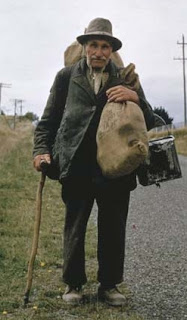Russian Jack
Russian Jack
Along New Zealand
Tramps or swaggers, during those lean years, were an important part of farm life, particularly during the harvesting season through summer and into autumn. During those early days of the horse and dray era, this wandering workforce could be relied on to turn up during those busy periods. A dry bed and a meal in exchange for some manual labour, the swagman and the cocky were usually well satisfied.
In 1912, a British ship by the name of ‘Star of Canada’ was plying New Zealand
One survivor of that disaster was a man by the name of Barrett Crumen, who has been fondly remembered as ‘Russian Jack.’
Born in Latvia during1878, in the small village of Alexandra
After his near death adventure, he spent some time in New Zealand waters working on small coastal ships, before he is said to have set off on a trek to Wellington
They say he was well known for his impressive appetite and his keenness for tobacco, along with his most prized possession, an old briar pipe.
During the winter months on the road, he was known to have stuffed paper inside his clothes in an effort to keep warm and is said to have plugged his ears with wads of brown paper soaked in mutton fat, which was believed to have been a deterrent against bugs.
I can’t imagine it, but he is known to have rubbed mutton fat onto his chest, believing it would ward off infection or whatever ailed him at the time. Hell’s teeth, he must have smelt a trifle high, like a dead sheep, after a while.
Those were tough times, sleeping under bridges, in culverts or under the shelter of tree branches for shelter. He is said to have carried the largest swag of any of those gents on the road.
Russian Jack is believed to have spent close to 53 years on the road. He would have gone on forever if he had had his way, but his feet let him down. In 1965, he was admitted to the Pahiatua Hospital Greytown Hospital
I believe he is buried in the Greytown Cemetery



Comments
Post a Comment